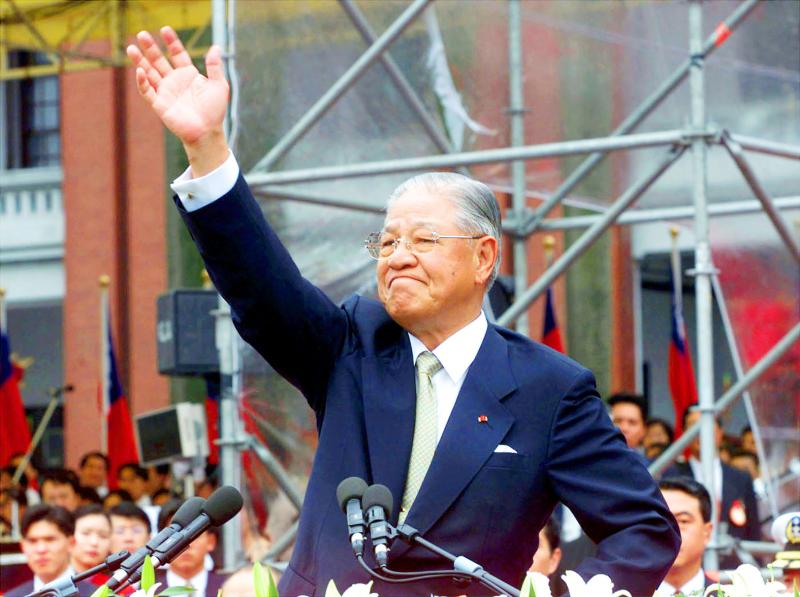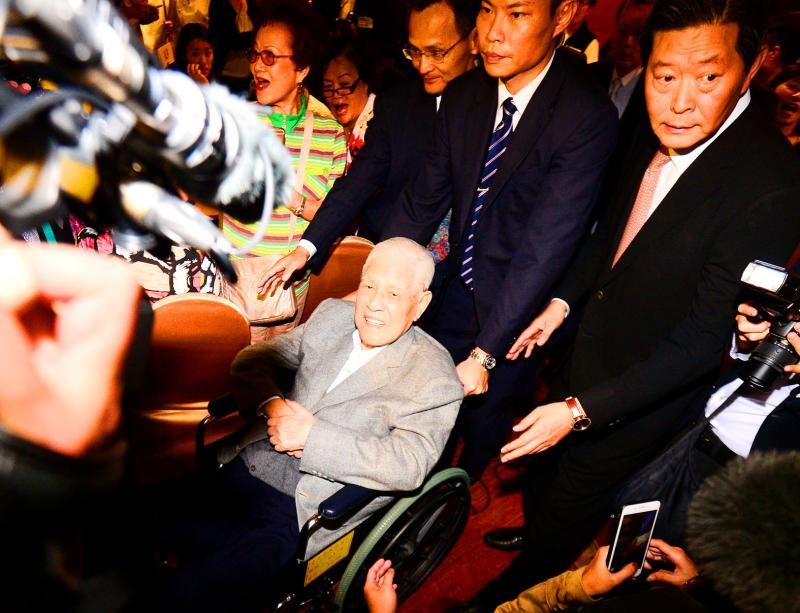Former president Lee Teng-hui (李登輝) passed away at 7:24pm yesterday at Taipei Veterans General Hospital. He was 97 years old.
The hospital stated the cause of death as septic shock and multiple organ failure.
Lee had been hospitalized there since February, when he choked on a mouthful of milk at home. He was later diagnosed with pulmonary infiltrates and aspiration pneumonia.

Photo: Reuters
The hospital said that Lee had been treated with antibiotics, but that his health had not improved, as his advanced age and diabetes had inhibited his immune system and led to recurring infections.
During his hospitalization, Lee underwent daily kidney dialysis, which removed electrolytes and excess liquids, so that nutrient solutions introduced via intravenous drip and blood infusions would bring him strength.
The hospital said that Lee’s body would remain at the hospital until Lee’s wife, Tseng Wen-hui (曾文惠), and his family, could make further arrangements.

Photo: Wang Yi-sung, Taipei Times
Yesterday, when a doctor announced Lee’s passing, Tseng was by his side, the hospital added.
During his lifetime, Lee underwent 12 stent procedures, 11 for his heart and one for his vertebral artery — installed when he was 92 years old.
Lee had been diagnosed with colorectal cancer in 2011 and underwent a colectomy to remove the tumor that year. In 2007, he was diagnosed with cataracts, and had an intraocular lens inserted in 2013.
President Tsai Ing-wen (蔡英文) expressed her deep sadness at Lee’s passing, and instructed the Presidential Office and other government agencies to offer Lee’s family whatever assistance they might need.
Presidential Office Secretary-General Su Jia-chyuan (蘇嘉全) said that Taiwanese should thank Lee for choosing democracy at a critical time in history, leading the country out from under the shadow of autocratic government.
Former president Ma Ying-jeou (馬英九) also offered his condolences to Lee’s family through his office, while affirming Lee’s contributions to Taiwan’s democratization.
Ma believes that while Lee’s political ideas underwent major changes after he left the presidency, history would render a just and objective evaluation of Lee’s career, the office said.
Taipei Mayor Ko Wen-je (柯文哲) yesterday posted a photograph of him visiting Lee at the hospital in May last year.
Lee is most admired not only for his political achievements, but also for his life philosophy, which is full of wisdom, Ko wrote on Facebook.
Lee allowed the nation to smoothly evolve from an authoritarian regime to a democratic one, and he was able to withdraw from the political scene at his peak, Ko wrote, describing Lee as a “hero of the era.”

CHAOS: Iranians took to the streets playing celebratory music after reports of Khamenei’s death on Saturday, while mourners also gathered in Tehran yesterday Iranian Supreme Leader Ayatollah Ali Khamenei was killed in a major attack on Iran launched by Israel and the US, throwing the future of the Islamic republic into doubt and raising the risk of regional instability. Iranian state television and the state-run IRNA news agency announced the 86-year-old’s death early yesterday. US President Donald Trump said it gave Iranians their “greatest chance” to “take back” their country. The announcements came after a joint US and Israeli aerial bombardment that targeted Iranian military and governmental sites. Trump said the “heavy and pinpoint bombing” would continue through the week or as long

TRUST: The KMT said it respected the US’ timing and considerations, and hoped it would continue to honor its commitments to helping Taiwan bolster its defenses and deterrence US President Donald Trump is delaying a multibillion-dollar arms sale to Taiwan to ensure his visit to Beijing is successful, a New York Times report said. The weapons sales package has stalled in the US Department of State, the report said, citing US officials it did not identify. The White House has told agencies not to push forward ahead of Trump’s meeting with Chinese President Xi Jinping (習近平), it said. The two last month held a phone call to discuss trade and geopolitical flashpoints ahead of the summit. Xi raised the Taiwan issue and urged the US to handle arms sales to

A magnitude 5.6 earthquake struck off the coast of Yilan County at 12:37pm today, with clear shaking felt across much of northern Taiwan. There were no immediate reports of damage. The epicenter of the quake was 16.9km east-southeast of Yilan County Hall offshore at a depth of 66.8km, Central Weather Administration (CWA) data showed. The maximum intensity registered at a 4 in Yilan County’s Nanao Township (南澳) on Taiwan’s seven-tier scale. Other parts of Yilan, as well as certain areas of Hualien County, Taipei, New Taipei City, Taoyuan, Hsinchu County, Taichung and Miaoli County, recorded intensities of 3. Residents of Yilan County and Taipei received

Taiwan has secured another breakthrough in fruit exports, with jujubes, dragon fruit and lychees approved for shipment to the EU, the Ministry of Agriculture said yesterday. The Animal and Plant Health Inspection Agency on Thursday received formal notification of the approval from the EU, the ministry said, adding that the decision was expected to expand Taiwanese fruit producers’ access to high-end European markets. Taiwan exported 126 tonnes of lychees last year, valued at US$1.48 million, with Japan accounting for 102 tonnes. Other export destinations included New Zealand, Hong Kong, the US and Australia, ministry data showed. Jujube exports totaled 103 tonnes, valued at